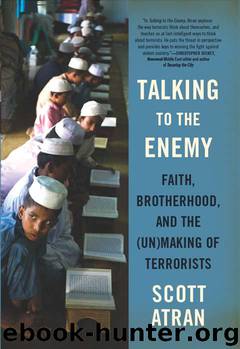Talking to the Enemy: Faith, Brotherhood, and the (Un)Making of Terrorists by Scott Atran

Author:Scott Atran [Atran, Scott]
Language: eng
Format: epub
Publisher: HarperCollins
Published: 0101-01-01T00:00:00+00:00
Altruism is the sacrifice of one’s own interests for the sake of others, as in giving to charity, lending a helping hand, or just taking time to offer directions to a stranger. Parochial altruism, especially bravery and heroism in war, involves sacrifice for one’s own group to the detriment of rival groups.9 Parochial altruism is a basic aspect of the evolutionary imperative of human populations to “cooperate to compete.” In all cultures, parochially altruistic acts are considered noble and good. Though what is good and noble in one culture and time can be evil and ignoble for another. Individuals within a society may also differ widely in their appreciation of the value of an altruistic act, such as suicide bombing or the struggle for civil human rights.
Charles Darwin, gathering an astounding amount of data from his voyage around the world as a naturalist aboard the HMS Beagle,10 and from other people’s observations, tried to show that all living kinds are basically competitive and selfish. The different forms of life, including humans and their cultural shells, develop through a process of natural selection that favors survival of the best competitors for resources. This, he argued in On the Origin of Species, promotes adaptations only for the individual’s own use in its struggle to gain resources to produce offspring: “good for itself,” but “never … for the exclusive good of others.”11
Under Darwin’s theory, if we give to charity or help children,strangers, and the infirm, it’s because we seek enhanced social status, or a heightened sense of self-worth, or affirmation of our belief that as we do for others in need so we expect others to do unto us should we become needy, or whatever else may serve our interests in the short or long run. “In the first place,” Darwin later wrote, “each man would soon learn from experience that if he aided his fellow-men, he would commonly receive aid in the end.” Charles Moskos, a former draftee who became one of America’s most respected military sociologists, observed: “In ground warfare an individual’s survival is directly related to the support—moral, physical, and technical—he can expect from his fellow soldiers. He gets such support largely to the degree that he reciprocates to others.”12
Heroism and martyrdom, however, go way beyond the principles of reciprocity, such as quid pro quo or even the Golden Rule. Darwin puzzled mightily over what would motivate “the bravest men, who were always willing to come to the front in war, and who freely risked their lives for others?” Since the brave were off risking death—or dying—more than others, they would have fewer offspring on average. “Therefore, it hardly seems probable, that the number of men gifted with such virtues … could be increased through natural selection, that is, by survival of the fittest.”13 Of course, Darwin acknowledged that the brave warrior who survives the fight will often gain more power or wealth or social worth or mates, and so improve his chances for reproducing healthy and successful offspring in greater numbers.
Download
This site does not store any files on its server. We only index and link to content provided by other sites. Please contact the content providers to delete copyright contents if any and email us, we'll remove relevant links or contents immediately.
| Buddhism | Christianity |
| Ethnic & Tribal | General |
| Hinduism | Islam |
| Judaism | New Age, Mythology & Occult |
| Religion, Politics & State |
Cecilia; Or, Memoirs of an Heiress — Volume 1 by Fanny Burney(31447)
Cecilia; Or, Memoirs of an Heiress — Volume 3 by Fanny Burney(31038)
Cecilia; Or, Memoirs of an Heiress — Volume 2 by Fanny Burney(30986)
The Secret History by Donna Tartt(16770)
Sapiens: A Brief History of Humankind by Yuval Noah Harari(13154)
Leonardo da Vinci by Walter Isaacson(11974)
The Radium Girls by Kate Moore(10969)
Sapiens by Yuval Noah Harari(4611)
How Democracies Die by Steven Levitsky & Daniel Ziblatt(4470)
The Wind in My Hair by Masih Alinejad(4458)
Homo Deus: A Brief History of Tomorrow by Yuval Noah Harari(4321)
Endurance: Shackleton's Incredible Voyage by Alfred Lansing(3893)
The Silk Roads by Peter Frankopan(3840)
Man's Search for Meaning by Viktor Frankl(3722)
Millionaire: The Philanderer, Gambler, and Duelist Who Invented Modern Finance by Janet Gleeson(3617)
The Rape of Nanking by Iris Chang(3569)
Hitler in Los Angeles by Steven J. Ross(3480)
The Motorcycle Diaries by Ernesto Che Guevara(3381)
Joan of Arc by Mary Gordon(3302)
